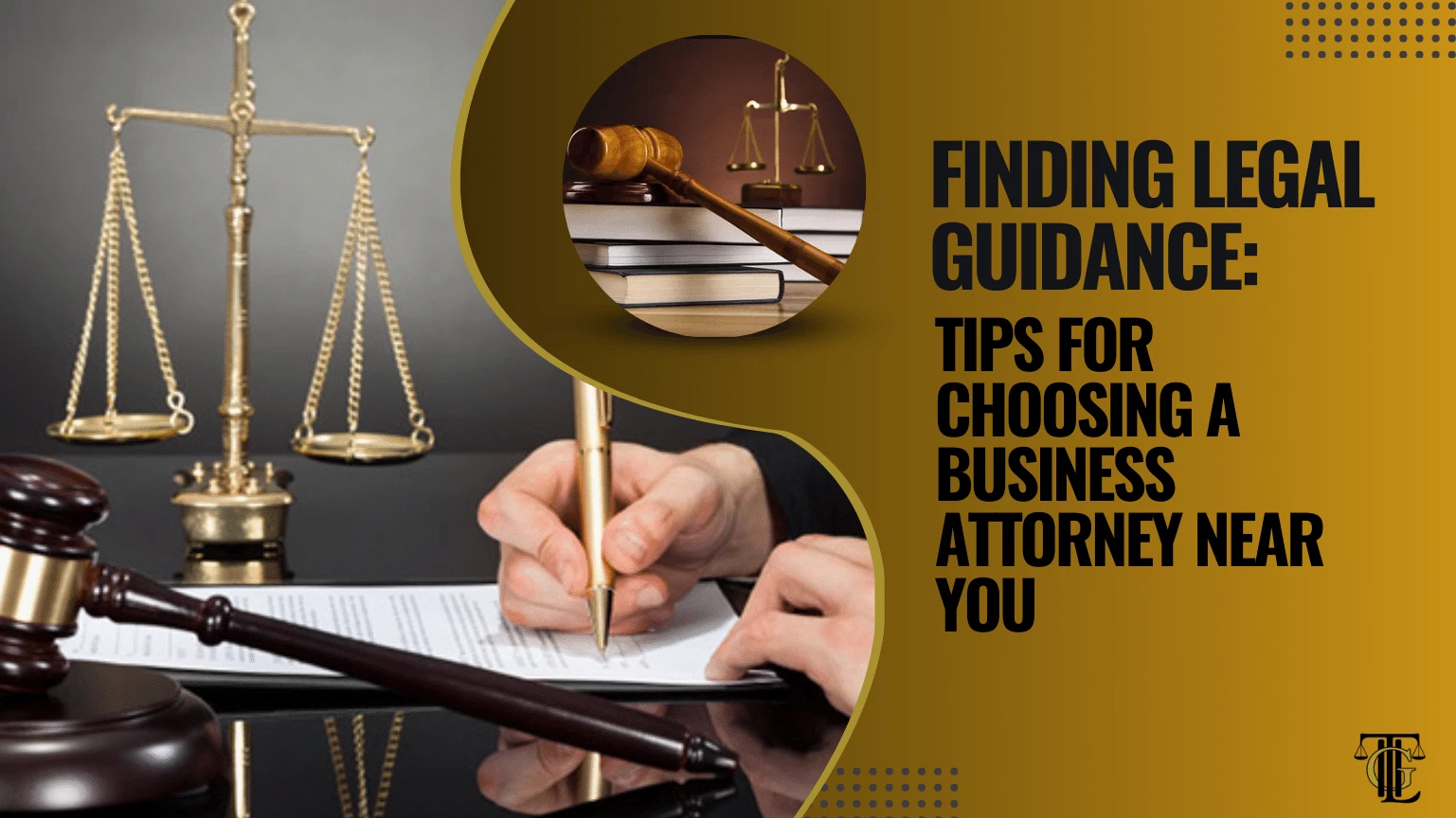Running a business is no easy feat – from navigating complex legal contracts to resolving disputes, the day-to-day operations can be overwhelming. That’s where a trusted business attorney comes in.
A skilled lawyer can provide invaluable guidance and support for entrepreneurs and businesses of all sizes. But with so many options available, how do you choose the right attorney for your specific needs?
In this blog post, we’ll explore tips for selecting a business attorney near you who is not only competent and experienced but also understands your unique industry and goals. Whether you’re just starting out or looking to switch attorneys, read on to learn how to find the perfect legal partner for your business success.
When selecting a business attorney near me, what factors should I consider to ensure they have the expertise and experience needed for my specific legal needs?
When selecting a business attorney, ensuring they have the expertise and experience needed for your specific legal needs is crucial. Here are some factors to consider:
- Specialization: Look for an attorney who specializes in business law or has significant experience in the specific area of law relevant to your needs, such as contracts, intellectual property, employment law, taxation, or corporate governance.
- Experience: Consider the attorney’s years of experience practicing law, especially in business-related matters. An attorney with a track record successfully managing similar cases will likely be better equipped to address your specific legal issues.
- Reputation: Research the attorney’s reputation within the legal community and among past clients. You can check online reviews, request referrals from other businesses or professionals, or consult local bar associations for recommendations.
- Communication skills: When dealing with legal issues, it is crucial to communicate effectively. If you want your questions answered quickly and updates on the status of your case sent to you, you need an attorney who can do that.
- Availability: Ensure the attorney has the time and resources to devote to your case. A busy attorney may be unable to help give your matter the attention it deserves, so consider their workload and availability before making a decision.
- Cost and billing structure: Discuss the attorney’s fee before to make sure it fits in with your plans and costs. While some lawyers charge by the hour, others may have flat rates or work on contingency. Get a good grasp on the ways you’ll be charged and what services are included.
- Compatibility: Feeling comfortable working with your attorney and confident in their abilities is essential. Make an appointment for a first consultation to go over your requirements and evaluate whether the attorney fits you and your business.
- Local knowledge: Hiring a business attorney familiar with your area’s local laws and regulations can be advantageous. They will have insights into local court procedures, judges, and other legal professionals that may impact your case.
- Track record: Inquire about the attorney’s track record of success in representing businesses similar to yours. Ask for references or case examples to gauge their effectiveness in achieving favorable outcomes.
- Continuing education and professional affiliations: A commitment to maintaining familiarity with current legal trends and ongoing involvement in professional organizations can indicate an attorney’s dedication to their practice and continuous improvement.
Through careful consideration of these aspects and extensive investigation, you will be able to select a business attorney with the expertise and experience needed to represent your interests and protect your business effectively.
How can I verify the qualifications and reputation of business attorneys before hiring them for my legal matters?
Verifying the qualifications and reputation of business attorneys before hiring them is crucial to ensuring you find the right fit for your legal matters. Here are some steps you can take to verify their credentials and reputation:
- Check their website: Most law firms have websites that provide information about their attorneys, practice areas, and notable cases. Look for attorneys specializing in business law or the specific area of law relevant to your needs.
- Review online profiles: Search for the attorney’s name on professional networking sites like LinkedIn or legal directories like Martindale-Hubbell or Avvo. These platforms often include attorney profiles with details about their education, experience, and client reviews.
- Check state bar associations: Visit the website of your state’s bar association or licensing authority to make sure the lawyer is licensed in your state jurisdiction. You can also check if they have any disciplinary actions or complaints filed against them.
- Ask for referrals: Reach out to other business owners, professionals, or colleagues who have previously worked with business attorneys. Their expertise can offer useful advice on their own experiences.
- Read client reviews and testimonials: Look for online reviews or testimonials from past clients to get a sense of the attorney’s reputation and the quality of their services. Remember that a few negative reviews may not necessarily indicate the attorney’s overall competence, so consider the general feedback.
- Consult with other attorneys: If you have connections with attorneys in other practice areas, they can refer you to reputable business attorneys or provide insights into the legal community’s reputation.
- Attend legal events and seminars: Networking events, seminars, and conferences related to business law are excellent opportunities to meet attorneys and learn more about their expertise and reputation within the legal community.
- Schedule an initial consultation: Many attorneys offer free or low-cost initial consultations where you can discuss your legal needs and evaluate whether the attorney is a good fit for your business. Use this opportunity to ask questions, assess their communication style, and gauge their understanding of your concerns.
- Check for industry recognition: Look for any awards, honors, or professional affiliations demonstrating the attorney’s commitment to their practice and recognition within the legal community.
- Trust your instincts: Ultimately, trust your instincts and choose an attorney you feel comfortable working with and confident in their abilities to handle your legal matters effectively.
By verifying the qualifications and reputation of business attorneys, you can make an informed decision and hire the right attorney to represent your business interests.
Are there specific areas of business law that I should prioritize when choosing a business attorney, such as contracts, intellectual property, or litigation?
The specific areas of business law that you should prioritize when choosing a business attorney depend on your company’s needs and the nature of your legal concerns. However, some common areas that many businesses often prioritize include:
- Contracts: Contract law is fundamental to business operations, as contracts govern relationships with customers, suppliers, employees, and partners. A business attorney experienced in contract drafting, negotiation, and enforcement can help you protect your interests and minimize risks associated with contractual agreements.
- Intellectual Property (IP): Intellectual property rights, including patents, trademarks, copyrights, and trade secrets, are critical assets for many businesses. Protecting and managing your company’s intellectual property requires specialized knowledge and expertise in IP law. An attorney with experience in IP law can assist with registration, licensing, enforcement, and defense of intellectual property rights.
- Corporate Governance and Compliance: Compliance with laws and regulations governing corporate governance, such as corporate structure, governance policies, shareholder agreements, and regulatory compliance, is essential for maintaining legal and ethical business practices. A business attorney can guide corporate governance matters and help ensure your company complies with applicable laws and regulations.
- Employment Law: Employment law governs the relationship between employers and employees and encompasses various legal issues, including hiring, termination, discrimination, harassment, wage and hour compliance, employee benefits, and workplace safety. An attorney with expertise in employment law can help you navigate complex employment-related matters and mitigate potential legal risks.
- Litigation and Dispute Resolution: Despite best efforts to prevent conflicts, businesses may still encounter disputes that require resolution through litigation or alternative dispute resolution methods such as mediation or arbitration. A business attorney experienced in litigation and dispute resolution can advocate for your interests and represent your company effectively in legal proceedings.
- Business Transactions and Mergers & Acquisitions (M&A): If your company is involved in business transactions, mergers, acquisitions, or joint ventures, it’s essential to have legal guidance throughout the process to ensure compliance with legal requirements, protect your interests, and negotiate favorable terms. An attorney with expertise in business transactions and M&A can assist with due diligence, negotiations, drafting agreements, and navigating complex legal issues.
- Taxation: Tax laws and regulations impact business operations, including entity formation, transactions, employment, and compliance. A business attorney with tax law knowledge can advise on tax planning strategies, compliance with tax obligations, and representation in tax disputes.
- Real Estate: If your business involves real estate transactions or property management, having legal assistance with real estate matters is crucial. A business attorney experienced in real estate law can assist with lease agreements, property acquisitions, zoning issues, land use regulations, and other real estate-related matters.
Prioritizing the areas of business law most relevant to your company’s needs and objectives will help you select a business attorney with the right expertise and experience to provide practical legal guidance and support.
Before deciding, can I request consultations or referrals from multiple business attorneys to compare services and fees?
Yes, it is both familiar and advisable to request consultations or referrals from multiple business attorneys before deciding. This practice allows you to gauge the expertise, experience, and compatibility of different attorneys, ensuring that you find one who not only comprehends the legal landscape of your business area but also aligns with your company’s culture and objectives.
Most attorneys offer initial consultations, sometimes free of charge, which allows them to discuss your business needs, ask questions about the attorney’s experience and approach, and understand their fee structure.
After initial consultations, comparing the services, fees, and interpersonal dynamics you experienced can guide you in making an informed decision. It’s essential to consider not just the cost but also the value an attorney brings to your business, such as their network, approach to solving legal issues, and ability to communicate complex legal matters in understandable terms.
Remember, the goal is to establish a long-term relationship with an attorney who will be integral to your business’s growth and success.
Get the Best Attorney for Your Business!
Selecting the ideal business attorney is pivotal for safeguarding and steering your business toward success. At Ligon Business & Estate Law, we understand this critical need and offer a personalized approach to meet your legal requirements. We suggest focusing on an attorney’s expertise, experience, and ability to understand and align with your business vision. Trust us to guide you through this crucial process.






